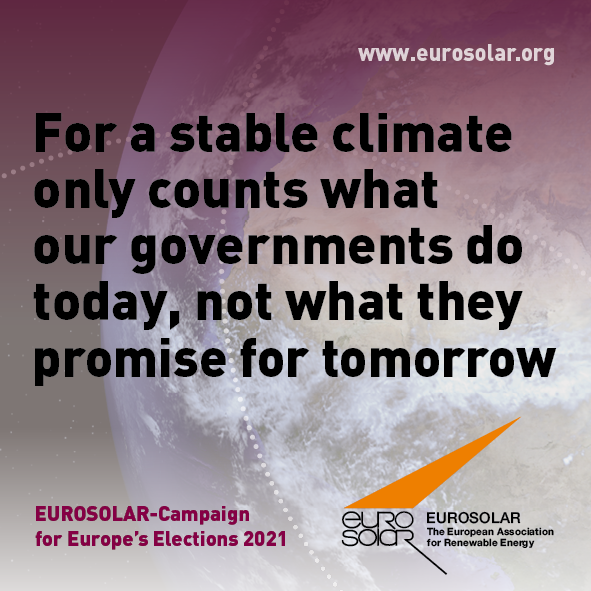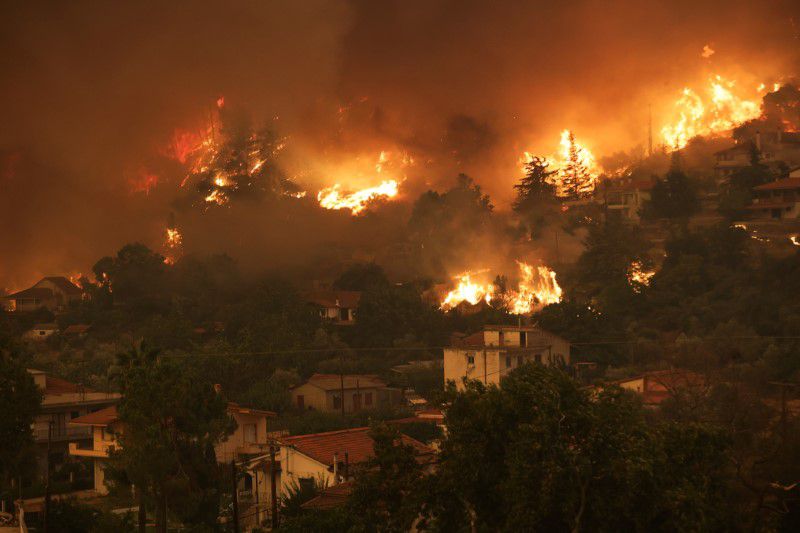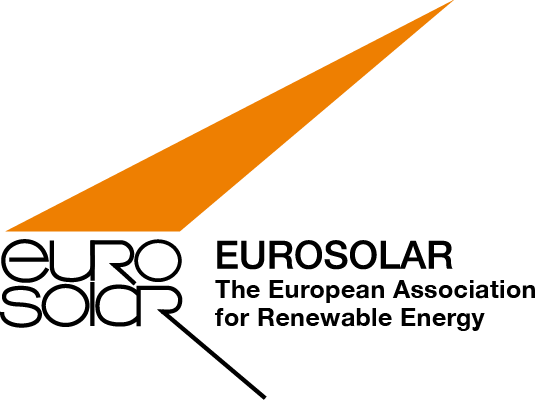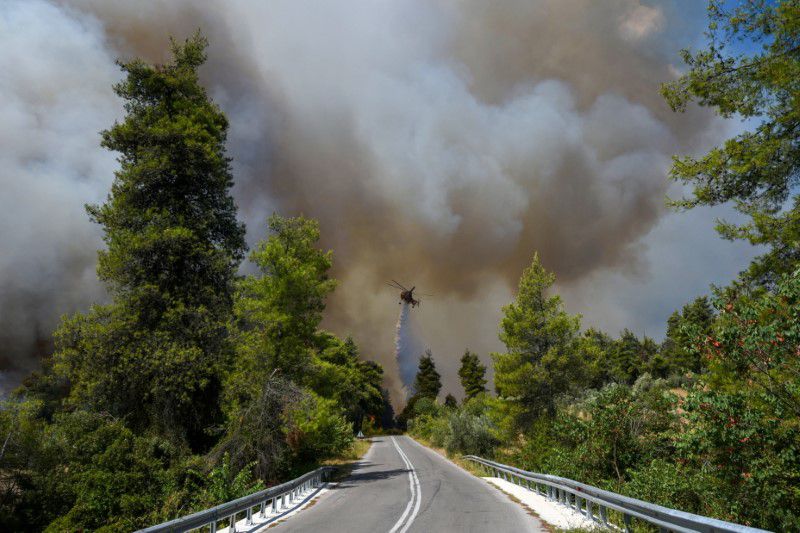EUROSOLAR-Campaign for Europe’s Elections 2021
All elections are climate elections. Norway, the Russian Federation, Iceland, Germany, Armenia, Switzerland, the Czech Republic, Estonia, Ireland and Bulgaria all hold elections from September through December 2021. Portugal, Liechtenstein, the Netherlands, Albania, Cyprus and Moldova already had recent elections – besides the many local and regional elections across Europe.
This is EUROSOLAR’s pre- and post-election campaign contribution, and compact guide to voters and elected officials alike.

For a stable climate only counts what our governments do today, not what they promise for tomorrow
The fact that it had to come to judgements by Dutch, German and other Constitutional Courts on Climate Protection makes only one thing clear: for all of us existentially important measures have been put off by our governments for far too long. The climate destabilization has progressed so far that full supply with renewable energies has now become a basic and immediate existential conditio sine qua non, a prerequisite for climate stabilization.
The necessary renewable technologies have long been available and are indeed mature. We must unleash them today and not wait for the day after tomorrow. Comprehensive energy policy measures will both overcome the pandemic and accelerate the climate-positive transformation.
What are we waiting for?
Take Germany, for example: once it was a globally celebrated pioneer – it has become a climate laggard over the last ten years, losing hundreds of thousands of valuable renewable energy industry jobs by succumbing to pressures by incumbent industries. Like other European countries from Greece to Siberia, from France to Great Britain the country has experienced in 2021 the existential threat that we all now experience on a daily basis: heat, drought, fires, floods, snap freezing temperatures. Surely this is the final wake-up call.

Europe’s new national governments must begin to implement the following as early as 2022: Abolition of all climate-damaging subsidies: oil, coal and natural gas still receive market-distorting benefits; trillions of euros in subsidies are expended annually world-wide for industry exemptions or direct fossil fuel tax supports. They prevent fair competition with renewable energies and can be abolished quickly.
CO2 pricing only makes fossil energy consumption more expensive; it contributes nothing to decarbonization. Instead, we need to build many more renewable energy plants. New fossil-fuel power plants must no longer be allowed to come online. The financial resources saved must be returned to the citizens and invested in a targeted manner in sustainable market ramp-ups – for climate-positive construction, electromobility or decentralized storage solutions.
The de-bureaucratization of renewable energies is crucial. Renewable energies are cheaper today than electricity from depreciated coal-fired power plants or the import of oil or gas. They save money and ensure good air quality in our cities. Together with regional electricity and heat storage facilities, they can largely meet our own needs. Autonomy in our own thermal energy needs and enough electricity that it is also sufficient for mobility must be fundamentally de-bureaucratized. This applies to home builders as well as to existing neighborhoods, local governments, businesses or industry.
The decision to buy the largest possible photovoltaic system, preferably with storage, and the installation must be as simple as buying a new refrigerator, or installing a sauna. Lengthy approval procedures and complicated building regulations must be scrapped or simplified. Tendering procedures, caps, levies and disproportionate distance regulations that inhibit citizen energy in particular must be eliminated. Let us use the opportunities of digitization only where they make sense. Only in this way digitization offers great opportunities in making the energy transition more efficient – it is not an end in itself.
Digital harassments such as arbitrary smart meter obligations violate consumer privacy rights and are only an obstacle to the rapid expansion of photovoltaics. Effective use of digitization means automatically controlling energy consumption in the home – and storing surpluses. Such efficient in-house technologies must become commonplace. Big Data and AI-controlled plants disenfranchise plant operators and lead to a recentralization of the energy transition through the digital back door.
EUROSOLAR demands:
- A true decentralized energy transition with rapid expansion of renewable plants, benefiting the climate, communities and all citizens.
- The nationwide installation of decentralized energy storage and load distribution.
- The phase-out of oil, coal and natural gas and no heedless rush into ill-considered hydrogen dependencies.
- All elections are climate elections. To create a framework of the overall measures needed to stabilize the climate, EUROSOLAR created a 10-point program in early 2020: the Regenerative Decade. Here we show the central and urgent role that the overall economic transformation regenerative European nations will assign to renewable energies: www.earthdecade.org.
(Title picture: A firefighting helicopter makes a water drop as a wildfire burns near the village of Ellinika, on the island of Evia, Greece, August 8, 2021. REUTERS/Alexandros Avramidis)

